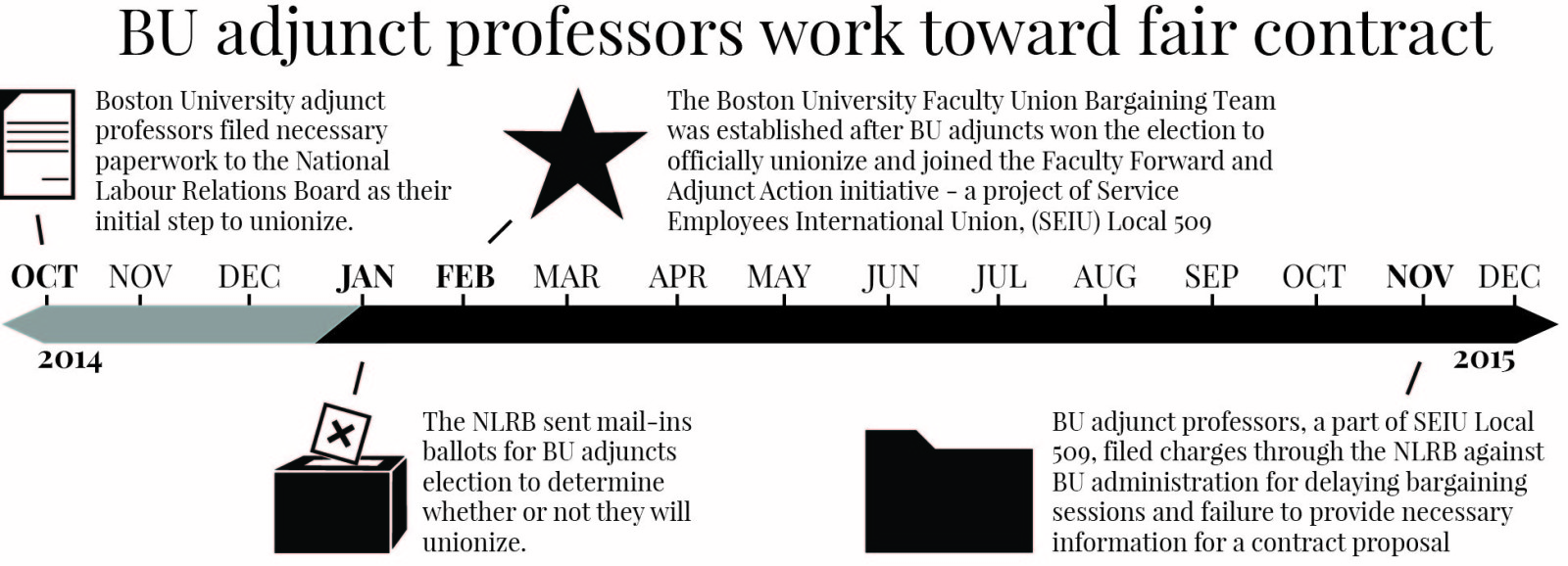
Boston University adjunct professors, part of the Service Employees International Union, Local 509, filed charges against BU through the National Labor Relations Board Nov. 4, according to the filed charges document sent to The Daily Free Press.
The charges filed are in response to the university’s failure to bargain in good faith by delaying bargaining sessions for approximately seven months and withholding information necessary to further proposals made by the union, stated in the filed charges document through NLRB.
The Boston University Faculty Union Bargaining Team disseminated an email to union members Nov. 12 and stated BU adjuncts had won the election to unionize “nine months ago” but is still waiting for BU administration to provide the necessary information to create a contract proposal.
“Under the law, we have the right to request information from the administration which is relevant for negotiations. We are still waiting for the administration to comply with our legal requests for information,” the email stated. “Is fairness and transparency too much to ask a University that claims global status; that holds itself out as a beacon of intellectual excellence and honesty?”
Established in February 2015 after winning an election through mail-in ballots sent by NLRB, the faculty union requested bargaining sessions throughout spring and summer of 2015 but were postponed until Sept. 10 from the union’s initial formation.
Laurie LaPorte, a lecturer in BU’s College of Arts and Sciences and a member of the organizing campaign and bargaining team, explained that fulfilling the informational request is necessary to proceed with bargaining.
“The hope is that [the BU administration] will provide the information we need to make proposals at the bargaining table,” LaPorte said. “Proposals are what spur discussion about faculty working conditions and student learning conditions and help us negotiate to come to a fair and equitable contract.”
LaPorte said her union involvement began while sharing an office with fellow adjuncts and comparing experiences with working conditions on campus.
“It really brought about my own awareness about how part-time and adjunct faculty are marginalized on the BU campus, how little say we have over our teaching conditions, advocating for our students, making decisions about where the university is going in terms of education,” LaPorte said.
Long-term commitment or loyalty to BU was incredibly difficult because of the marginalization, LaPorte said.
“I met so many part-time and adjunct faculty who were experiencing the same things — not knowing when they would have the next course, having courses cancelled at the last minute, not being able to find other work or having students approach them asking, ‘When can I take my next class with you, or can you be my adviser?’ and having to say, ‘I don’t have the answers to that,’” she said.
Fellow adjunct lecturer in CAS and bargaining team member Dan Hunter echoed LaPorte’s concerns and said it is important for BU to respond to the charges filed.
“The core of [filing the charges] is two-fold — failure to provide the requested information, which we have a legal right to, and stalling, delaying,” Hunter said. “We cannot move forward with valid proposals for change in pay structure and benefits and professional development until we get this information, because we don’t know how the university values teaching.”
Hunter argued that the adjuncts are close to invaluable to the university, accounting for the instruction of more than 1,300 classes last year alone.
“The issue here is how we’re going to put together the best teaching for the students, and to do it in a way that doesn’t drive up the cost for students,” he said. “That’s one of the reasons why we formed the union, because we were being left out of any discussion of that, as if we weren’t going to be here again next year. I’ve been teaching here for 15 years. We’re not going to go away, so you can’t think of us as being invisible.”
Hunter said the charges filed brought light to the idea that this is not an issue on a single campus, but a nationwide discussion.
“This is a national issue of higher education, where we have to indicate what is the value of teaching,” Hunter said. “We need to have a debate and an open discussion, and that has to include students, it has to include parents, it has to include alumni.”
BU’s attorneys did not respond to comment requests.
“Boston University is still actively bargaining an initial contract with its part-time faculty union,” BU spokesman Colin Riley wrote in an email. “We decline to comment on a pending legal matter.”





















































































































